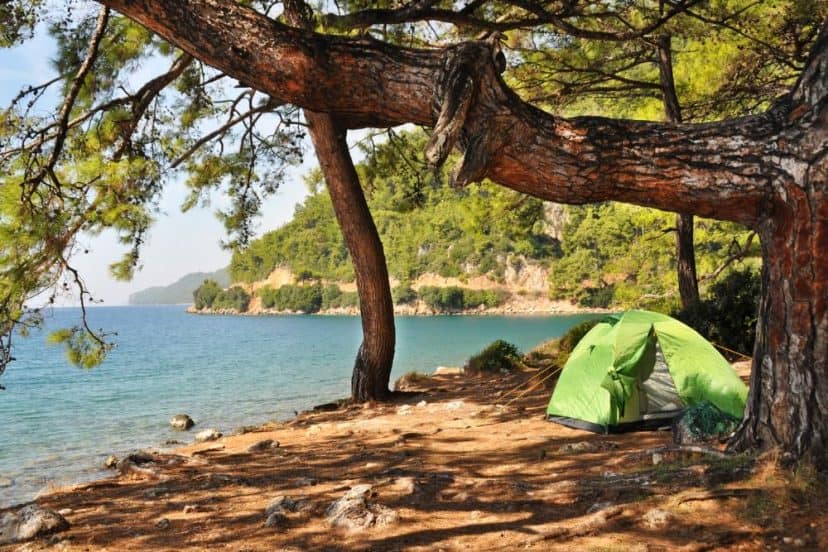Best Camping Tent For Beach And Canopies in 2024
Understanding the Need for a Beach Camping Tent
There is a unique charm to beach camping that speaks to the adventurer in all of us. The primal rhythm of the waves crashing onto the shore, the tangy scent of the ocean air, and the warmth of the sand beneath your feet all make beach camping a mesmerizing experience.
The key to fully enjoying this experience, however, is ensuring you have the best camping tent for the beach.
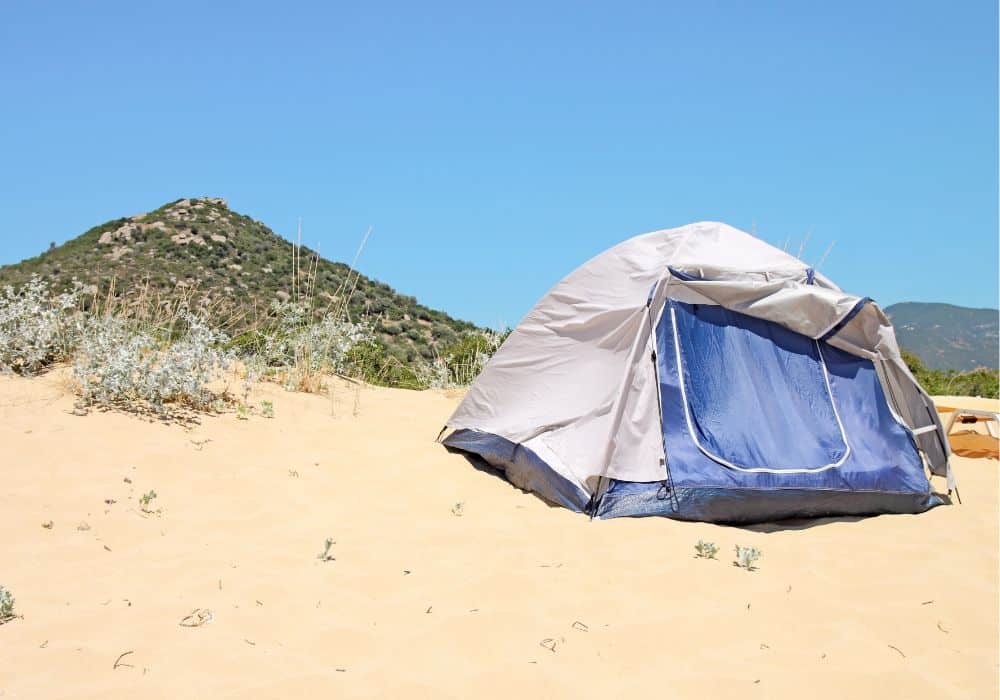
The best tent for a beach camping excursion is not merely a shelter but also a haven. It gives a sense of home amidst the wilderness, standing guard against harsh climatic vicissitudes while you sleep under the stars.
The best beach tent ensures comfort, safety, and ease of use, helping you to create unforgettable memories while staying close to Mother Nature. There’s no arguing that the right beach camping tent is an essential investment for any nature enthusiast or seasoned beach camper who values both form and function.
Factors to Consider When Choosing a Beach Camping Tent
Selecting the ideal beach camping tent relies on a thorough understanding of essential features and conditions you are likely to encounter. One significant variable to consider is the potential effect of strong and high winds. Coastal regions are often subject to sudden wind gusts, and without the correct preparation, your shelter could be at risk.
Look for models specifically designed to withstand turbulent conditions, with features such as reinforced corners, heavy-duty zippers, and robust guylines.
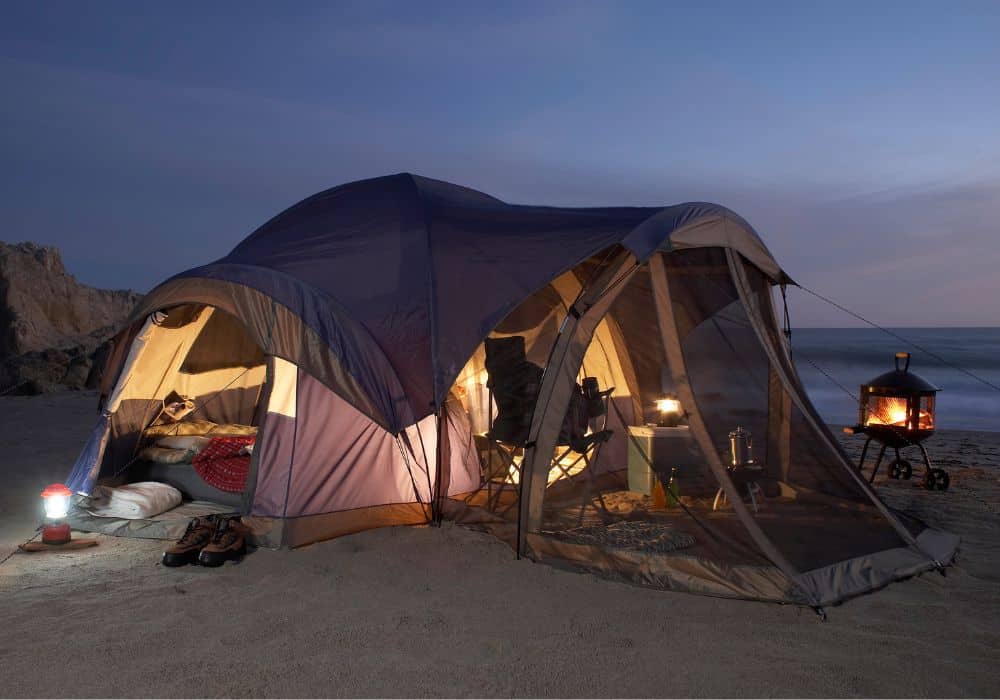
Another essential factor is the presence of large windows in a beach camping tent. This feature ensures that there is sufficient ventilation within the tent, an important aspect during hot summer months. Large windows can also provide an unrestricted view of your beach surroundings, enhancing the overall camping experience.
Yet, it’s essential to check that these windows can be securely closed to maintain the tent’s structural integrity in high winds and during unexpected rain showers.
Importance of Tent Material and Design for Beach Camping
When planning for beach camping, the selection of the right tent material can greatly enhance your beach experience. One primary feature to look for in tent material is large mesh windows.
These windows not only provide excellent ventilation to keep the tent cool in the beach’s warm climate, but also offers a panoramic view of your beach surroundings, adding an element of charm to your camping.
The material should as well be durable and weather resistant to withstand the harsh conditions often associated with beach environments such as salt, sand, and moisture.

The design of the tent equally plays a critical role for beach camping. A tent with a design focusing on sun protection is highly essential. The beach’s open environment often lacks shade, exposing you to the risk of sunburns.
As such, tents with sun protection offer a safe haven from harmful UV rays, guaranteeing your health safety. Furthermore, the design should offer an easy setup. Beach camping is typically a leisure activity and, as such, the last thing you want is spending a lot of your relaxation time grappling with complicated tent setup procedures.
Therefore, a tent with an easy setup design can save you time and allow more enjoyment.
Considering the Size and Weight of Your Beach Tent
Size matters when selecting a beach camping tent, particularly when combating windy conditions. Your tent’s size can significantly influence its stability in winds, as large tents catch more wind and are thus harder to secure. A smaller tent with a low profile design could fair better in these conditions, but it may sacrifice interior space, comfort, and headroom.
It’s crucial to strike a balance between space and wind-resistance, keeping in mind the number of campers and amount of gear you’ll be housing.
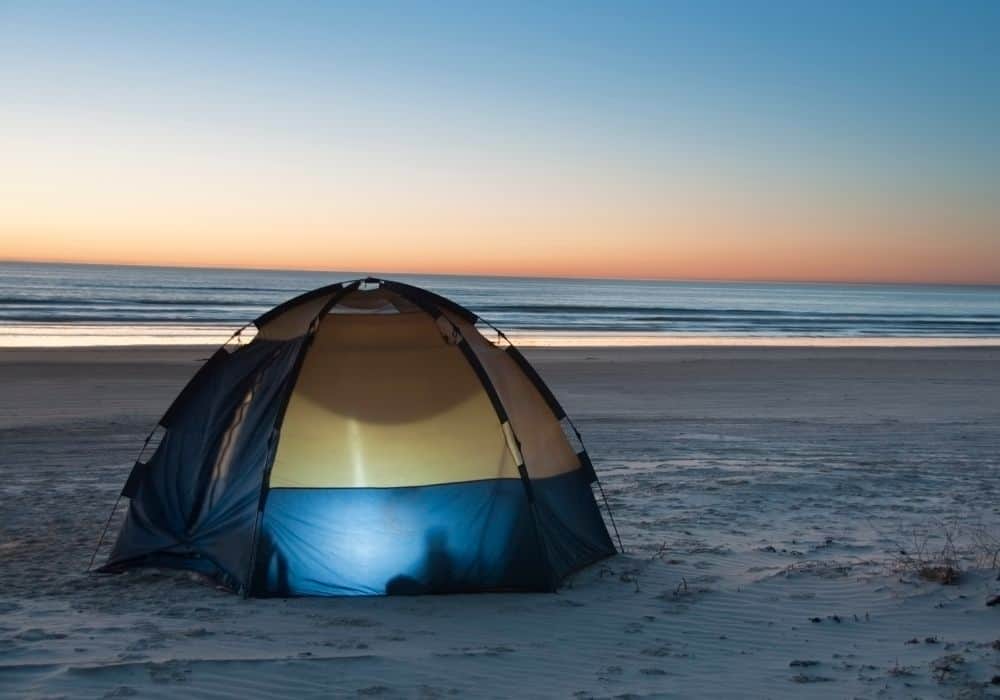
Weight is no less important, especially when considering portability. Your beach tent should be lightweight enough to carry comfortably in the included carry bag from your vehicle to your chosen camp spot on the beach.
However, a too lightweight tent may lack in essential features like robust UV protection or sturdy materials. Hence, ideally, your beach tent should be light, compact, but still durable and robust enough to withstand everything the beach environment can throw at it.
Why Ventilation Matters in a Beach Camping Tent
Ventilating a beach camping tent is of utmost importance, particularly during warm, sunny beach days. A well-ventilated tent will allow for a healthy air exchange, keeping the occupants cool and comfortable. This should be a deciding factor for larger groups using a beach canopy for their day out.
When a canopy is intended for community use, air flow can become vital in maintaining a comfortable, relaxed environment for its occupants.
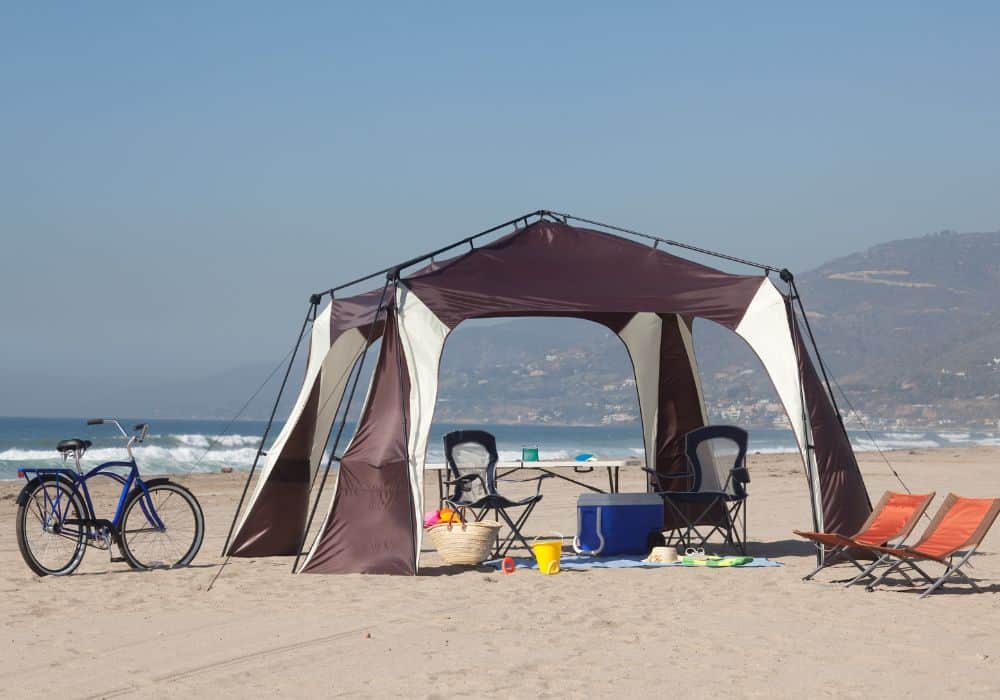
The advantage of investing in a beach camping tent with proficient ventilation doesn’t just lie in the realm of comfort but also greatly impacts the tent’s ease of use.
Proper ventilation prevents condensation from forming inside the tent. Dampened interiors, as a consequence of poor ventilation, can lead to discomfort and potentially damaging the tent material. Hence, it’s essential to consider the ventilation feature before making that purchase.
Ease of Set Up and Pack Down for Beach Tents
Regardless of how aesthetically pleasing or pricey a beach camping tent might be, if it’s complicated to set up or break down, the usability drops significantly. The last thing you want is to spend a chunk of your beach day wrestling with a tent instead of enjoying the sand and waves.
High-quality materials often translate to simplicity in assembling and disassembling. A tent’s set-up time can be dramatically reduced with smart design features.
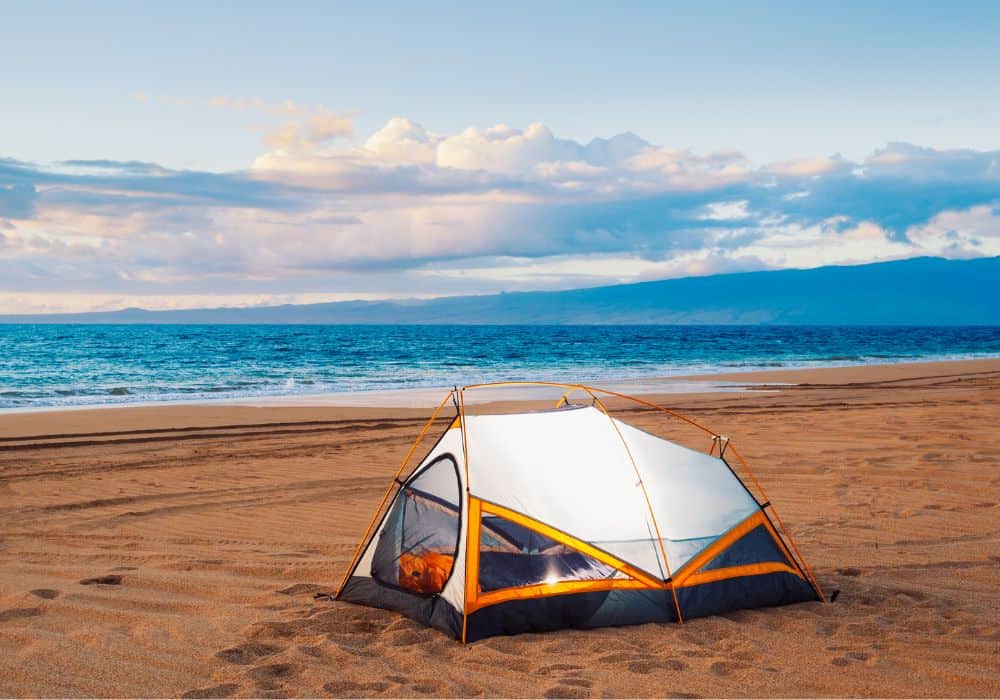
Pop-up tents and shibumi shades are great examples of beach camping tents that prioritize ease of use. Simply stated, a pop-up tent requires no time-consuming assembly as it expands into shape when removed from the carrying bag.
The popularity of the shibumi shade is largely attributed to its stress-free setup, perfect for beach goers who desire minimal hassles. Truly, simplification in the setup and pack down process can enhance overall camping experiences, allowing more leisure time on the beach setup, regardless of one’s camping expertise.
Weather Resistance of Beach Camping Tents
A beach camping tent with excellent weather resistance is a crucial factor to consider, especially if you aim to use it regularly. On sunny days, the gleaming heat could be relentless, and the last thing you want is to get scorched inside your tent.
Hence, a true weather-resistant beach tent should have features such as a UV-protected material to shield you from harmful rays, and water-resistant surfaces to keep unexpected showers at bay.
Furthermore, lookout for additional features that promote convenience and comfort, such as storage pockets and a shoulder strap. Storage pockets come in handy for keeping your valuables safe and organized, especially when the weather turns windy and items could potentially be blown away.
A shoulder strap, on the other hand, makes transportation easier when you need to move the tent to a more sheltered location due to unexpected weather changes. These attributes are as integral to your beach camping experience as the tent’s resistance to weather elements.
Exploring Different Tent Shapes Suitable for Beach Camping
When considering a beach vacation, it’s important to take into account the variety of shapes that the best camping tents come in. Dome tents, for instance, are a popular option due to their stability and easy setup. Their curved shape also allows for excellent rain runoff, a bonus if the weather turns adverse.
These tents offer ample headroom in the center, which can come in handy when moving around inside the tent, especially after a long day of lounging in beach chairs under your beach umbrella.
On the flip side, tunnel tents offer a different set of advantages. They are generally spacious with high ceilings throughout, allowing for comfortable movement and sleeping arrangements.
This space can also be ideal for storing bulky beach equipment like beach chairs and beach umbrellas securely overnight.
However, their setup can be a little more complex and they may not hold up as well in strong winds due to their elongated shape. Keep in mind that the shape of the tent you choose can also have a significant impact on the tent’s weight and packed size, two crucial factors for beach camping.
Benefits of Sun Protection in Beach Camping Tents
One of the main selling points of a beach camping tent is the sun protection it offers. This feature is often overlooked but in reality, it can make a world difference on your beach camping trip.
Possessing UV-ray protection capabilities, these tents are a great option for those who are concerned about the harmful effects of sun exposure. From sunburns to glare, a beach camping tent can drastically reduce the sunlight effects, making the experience more enjoyable and safe.
Furthermore, tents with a pop-up design add an extra layer of convenience to this sun protection feature. These tents are easy to set up and take down, offering you more time to have fun in the sun without worrying about complex assembly procedures.
This ease-of-use also comes handy for families with small children. Kids are particularly vulnerable to sunburns, so having a spot of shaded refuge available quickly is essential. To combine both sun protection and simple setup, a beach camping tent with a pop-up design could be the ideal solution.
Insights on the Durability of Beach Camping Tents
When planning a beach camping trip, pondering over the durability of your tent becomes obligatory. It is primarily defined by the material of the tent and its alignment with features that are conducive to a beach environment. One key feature to consider is the type of fabric used for the tent.
A water-resistant fabric is a must for any beach tent, as it should be capable of withstanding both rain and the ocean spray. Picking a tent made of sturdy, high-quality, water-resistant fabric can significantly extend the tent’s lifespan and contribute significantly to its overall durability.
A hybrid beach tent usually incorporates multiple advantageous features that enhance their sturdiness and resistance to harsh beach conditions. For instance, sand pockets, a common element of hybrid beach tents, play a pivotal role in fortifying the tent’s stability.
These can be filled with sand to weigh the tent down, preventing it from being blown away by strong coastal winds, while also reducing strain on the structure itself. Considering such factors while making a purchase decision is crucial to ensure the long-lasting nature and performance of your beach camping tent.
The Role of Tent Poles in Beach Camping Tents
Tent poles play a pivotal role in ensuring a successful beach camping trip. They are the backbone of the tent’s structure, providing it with the necessary stability and rigidity. Advanced designs incorporate flexible yet sturdy poles that can withstand harsh weather conditions.
These robust tent poles enable the tent to endure strong seaside winds without collapsing, hence guaranteeing the safety and comfort of the campers.
Moreover, tent poles are instrumental in defining the tent’s spacious interior. The proper placement and arrangement of the poles dictate the overall space within the tent.
Be it a small tent intended for solo trekkers or a large family-sized tent, the poles help to maximize the room available for sleep and storage. In essence, the importance of tent poles in beach camping extends beyond mere structural support; they also amplify the usability and functionality of the camping tent.
Consideration of Privacy Features in Beach Camping Tents
Including privacy features can transform the beach camping experience, making it more comfortable and enjoyable. For instance, a beach camping tent with built-in room dividers or curtains allows for individual space within a larger one.
This feature proves beneficial when camping with a larger group or family, providing you ‘personal corners’ in a shared space. The ‘right tent’ with such attributes could also include strategically placed sand anchors to keep the set-up stable, ensuring that even with spaces created inside, the structural integrity of the tent remains intact.
Such privacy features are especially crucial when the beach camping tent is being used for changing clothes or for other such purposes, allowing for easy access and maneuverability.
The installation of high-quality, corrosion-resistant zippers that can withstand the harsh beach environment adds to the element of privacy in a tent.
So, when selecting your beach camping tent, consider one that offers a balance of both – communal camping spirit and privacy, enhancing your overall beach camping experience.
Understanding the Cost of Beach Camping Tents
When it comes to exploring the great outdoors and having a fantastic beach day, the significance of a good beach camping tent cannot be overstated. However, alongside its functionality, the cost is an essential factor to consider.
Tents come in various prices, influenced by differences in key features, materials, and design. Some can be economical, whereas others are more pricey, often reflecting the quality and longevity of the tent.
For instance, tents with aluminum poles tend to come at a higher cost due to the strength, durability, and lightweight nature of this material. Yet, despite the initial investment, they can prove to be a great choice in the long term.
Other factors influencing the price can be size, design, extra features, and the brand itself. Investing in a high-quality beach camping tent may result in more beach days with less hassle, indicating price sometimes equates performance.
Advantages of Sand Anchors in Beach Tents
Sand anchors play a crucial role in providing stability to your beach tent, which is particularly useful in windy conditions. This is a situation where the Oileus XL beach tent, one of the top picks among beachgoers, excels.
This particular beach tent stands out due to its heavy-duty and well-designed sand anchors that are both sturdy and reliable. The anchors allow the tent to remain firm and steady on sandy beach floors even in challenging weather situations, thereby ensuring an uninterrupted and enjoyable beach camping experience.
Sand anchors also aid in the overall durability of the beach tent. Generally, a tent with robust sand anchors can withstand the elements longer, lessening the chances of damage. Another feature to consider in this context is the UPF rating.
The Oileus XL beach tent, for instance, combines reliable sand anchors with a high UPF rating, making it resistant not only to wind but also to harmful UV rays. Hence, a high-quality beach tent with effective sand anchors and a good UPF rating ensures not only product longevity but also greater safety for its occupants.
Importance of a Strong Zipper in a Beach Camping Tent
When camping with larger groups at the beach, ease of movement in and out of the tent becomes pivotal. A strong zipper plays a major role in this context, ensuring seamless access while also maintaining the structural integrity of the tent.
With constant exposure to sand, salt, and moisture, the strength and durability of a tent’s zipper can dramatically influence the user’s overall camping experience.
Beach camping tents are often exposed to a range of climatic conditions, making features like great ventilation crucial. A well-functioning zipper facilitates the effective opening and closing of tent flaps, directly impacting ventilation.
Despite the compact size of many beach tents, with a strong and reliable zipper, the potential for a comfortable and robust camping experience is significantly enhanced. Thus, when choosing a tent for beach camping, the strength and quality of the zipper should never be overlooked.
The Role of Pockets and Storage in Beach Camping Tents
Beach camping can be a delightful experience for a small family looking to bond over an unforgettable outdoor adventure. However, without proper organization, this experience can easily turn into a chaotic mess.
Pockets and storage compartments in a beach camping tent serve a vital role in maintaining this organization, thereby enhancing the overall camping experience. These features allow campers to neatly arrange their belongings, preventing them from being misplaced or damaged.
Despite adding a bit to the overall price tag, their utility is priceless, evident in the way they provide a more organized and harmonious camping experience.
Moreover, pockets and storage contribute to maximizing the effective use of space. In a beach camping tent, every square foot of shade is crucial for comfort, relaxation, and enjoyable family time.
By strategically storing belongings in pockets and storage compartments, one can free up the floor area, thus creating a spacious environment inside the tent.
This effective use of space significantly enhances the overall comfort inside the beach camping tent, making these features not only a matter of convenience but of fundamental design and space efficiency.
Benefits of a Porch Area in a Beach Camping Tent
Investing in a high-quality beach camping tent with a porch area brings numerous advantages. One of the key benefits is an expanded living space that can serve a variety of functions, depending on your camping needs.
For instance, the porch area can comfortably accommodate essential items such as water bottles and beach gear, reducing clutter in the sleeping quarters.
Moreover, the added porch area often fits a picnic table, thereby enhancing comfort during meal times.
This region often acts as a transitional space, where beach sand can be dusted off before entering the main tent, helping to keep your sleeping area clean. Thus, a porch area in a beach camping tent significantly improves your overall camping experience at the beach.
How to Maintain and Clean Your Beach Camping Tent
Care and maintenance of your beach camping tent starts from the moment you set it up. Direct and prolonged exposure to harmful UV rays can degrade tent fabric over time.
Therefore, if you’ve pitched your tent for the day, it’s advisable to position it in shaded areas or take it down when not in use to mitigate the effects of the sun’s damaging rays.
After a day of use, especially if you’ve been camping near the water, your tent can accumulate sand and moisture. This is where good ventilation comes into play. Open all the vents and doors to air out the tent.
If it’s a sunny day, give it a solid shake and hang it on a dry line to ensure all the moist sections are thoroughly dried out to prevent mildew and keep the tent in optimum condition.
What to Avoid When Selecting a Beach Camping Tent
When plunging into the search for the perfect beach camping tent, it’s crucial to take note of a few pitfalls. One common mistake campers make is overlooking the importance of UPF protection.
This feature is vital in tents designed for the beach, as it determines how well your shelter can filter out harmful UV rays from the sun. Choosing a tent without sufficient UPF protection could expose you to the risk of sunburns and, in dire circumstances, skin cancer.
Another aspect shoppers often neglect is merely opting for beach canopies instead of fully-enclosed tents. Though these canopies may provide shade, they fail to offer shielding against winds or privacy for changing clothes.
Beach canopies also usually lack the in-built features found in tents like pockets for storage or a floor to separate the occupants from the sand. Recognizing and avoiding these common oversights can make the difference in creating an ideal beach camping experience.
Choosing the Right Beach Camping Tent for Your Needs
Selecting the perfect beach camping tent often relies on a number of key aspects, tailored to your individual needs and preferences. Firstly, the tent’s size and weight are crucial considerations, as these will affect transport and setup ease.
Larger tents often provide more comfort and space, but do come with added bulk and weight. Therefore, if you’re planning a solo trip or a small family outing, it’s reasonable to opt for a compact and lightweight design; however, for larger groups, a more substantial tent may be required.
Secondly, the tent’s material and design play pivotal roles in durability and weather resistance. For beach camping, having a tent crafted from sturdy, water-resistant materials is a must.
Particular attention should be paid to the shape of the tent, as it should withstand strong beach winds. High-quality zippers and strong tent poles also add to the tent’s longevity.
Moreover, features like good ventilation, privacy capabilities, sun protection, and additional provisions such as pockets for storage or a porch area can significantly enhance your camping experience. Input from past customers can also be very helpful while shopping; reviews can provide insightful details about the tent’s performance in real-life situations.
FAQs
Why do I need a specific tent for beach camping?
Beach camping tents are designed to withstand the unique conditions at the beach such as strong winds, sand, and saltwater. These tents are generally more durable and offer better ventilation and sun protection than regular tents.
What factors should I consider when choosing a beach camping tent?
You should consider factors such as the tent’s material and design, size and weight, ease of setup and pack down, weather resistance, shape, sun protection, durability, and the quality of its poles, zippers, and storage options.
How important is the material and design of the tent for beach camping?
The material and design of the tent are very important for beach camping. The tent should be made of durable materials to withstand harsh weather conditions and its design should provide good ventilation, protection from the sun, and resistance to sand and saltwater.
What size and weight should my beach tent be?
The size and weight of your beach tent should depend on your needs and the number of people who will be using it. However, it’s always a good idea to go for a lightweight and compact tent for easy transportation and setup.
Why is ventilation important in a beach camping tent?
Ventilation is crucial in a beach camping tent to keep the interior cool and comfortable, especially during hot and humid weather. It also helps to reduce condensation inside the tent.
How important is the ease of setup and pack down for beach tents?
The ease of setup and pack down is very important for beach tents. You don’t want to spend a lot of time setting up or packing down your tent, especially in adverse weather conditions.
What are the benefits of sun protection in beach camping tents?
Sun protection in beach camping tents prevents harmful UV rays from penetrating the tent, keeping the interior cool and protecting your skin from sun damage.
What is the role of poles in a beach camping tent?
Poles provide structure and stability to a tent. For beach camping, it’s important to have strong and durable poles that can withstand strong winds and rough weather conditions.
Why are privacy features important in beach camping tents?
Privacy features, such as curtains or zipped doors, are important in beach camping tents to provide privacy when changing clothes or sleeping.
What is the average cost of a beach camping tent?
The cost of a beach camping tent varies widely depending on its size, material, design, and other features. However, you can expect to pay anywhere from $50 to several hundred dollars for a good quality tent.
Why are sand anchors beneficial in beach tents?
Sand anchors help to secure your tent in the sand, providing stability and preventing it from being blown away by the wind.
How can I maintain and clean my beach camping tent?
To maintain and clean your beach camping tent, you should rinse it with fresh water after each use to remove any salt or sand. Dry it completely before storing it to prevent mold and mildew.
What should I avoid when selecting a beach camping tent?
When selecting a beach camping tent, avoid tents that are too heavy or bulky, lack ventilation, have poor-quality poles and zippers, and don’t offer enough sun protection or durability.
How can a porch area benefit my beach camping experience?
A porch area in a beach camping tent provides extra space for relaxation, cooking, or storing gear. It can also offer additional shade and protection from the sun.

